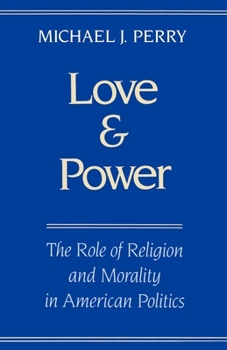Love and Power: The Role of Religion and Morality in American Politics
Select Format
Select Condition 
Book Overview
In this sequel to his Morality, Politics, and Law, Michael Perry addresses the proper relation of moral convictions to the politics of a morally pluralistic society. While his analysis focuses on religious morality, Perry's argument applies to morality generally. Contending that no justification of a contested political choice can be neutral among competing conceptions of human good, the author develops an ideal of "ecumenical politics" in which moral...
Format:Paperback
Language:English
ISBN:0195083555
ISBN13:9780195083552
Release Date:April 1993
Publisher:Oxford University Press, USA
Length:240 Pages
Weight:0.70 lbs.
Dimensions:0.6" x 4.8" x 8.7"
Customer Reviews
1 rating
Not quite a work of genius, but a good discussion!
Published by Thriftbooks.com User , 20 years ago
I read this book and am writing this review after the famous/infamous supreme court ruling of Lawrence v. Texas, the one that repeals the Texas gay sodomy law. Needless to say, there is much discussion for and against this decision. Many objectors are using religious arguents. Should they or should they not be allowed? Even as an atheist, I'm becoming dissatisfied with the manner that religious arguments are being excluded from the 'table of ideas' just for mentioning the 'g-word'. Perry is a law professor at Emory (he was at Northwestern when this book came out). "Love and Power" is a sequel to his book "Morality, Politics, and Law" [see my review] and extends its arguments about the impossibility of a truly neutral politics. Liberalism (that is, in a Lockean sense)is fond of discussing 'neutrality' which has given them a rationale to oust 'g-word' arguments from the table. Perry's first job is to show that neutrality theorists like Bruce Ackerman and John Rawls are advocating a pipe dream. Quick example: On abortion, neturality theorists think that non-legislation, since its non-legislation - is a neutral stance. They also feel that arguments for regulation, when based on religous arguments, are not neutral. Therefore, only secular (supposedly neutral) arguments can be heard. One easily sees why this view is anything but neutral. After Perry gets done there, he outlays his urging of 'ecunemical' politics that strives - not to remain impossibly neutral - but to devise arguments that are as acceptable to as many people as possible. These arguments, of course, may well be religious in nature and, yes, some people (hard atheists) might get hosed. Perry's point, though, is in order for anyone to take a stance on anything, it is necessary that she argues a point and that point will not be agreed upon by all (after all, why would there be a discussion if everyone agreed?). Perry argues, though, that 'secular' intellectualism has tended to over-exagerate any excluding effect that religious moral argument has. After all, most religions (and secular philosophies) share many of the same tenets, like resepct for life. Can the exlusion factor really be that high?Overall Perry has written another great (but brief, at 137 pages less endnotes) book. The reader should read "Morality, Politics, and Law" first as many of the ideas in this book are first explored (and more thoroughly) in that book - that one being more of an 'all around' book instead of having a more religious focus. The only problem is that I didn't come away thinking that Perry dealt with criticisms as much as he could. His view, after all, - that we should engage in pluralistic and sympathetic debate - can approach a 'head in the clouds' feel. For my money, I find Perry's uncompromising pluralism to be a welcome change in law. Still, more rigor would've been nice.





